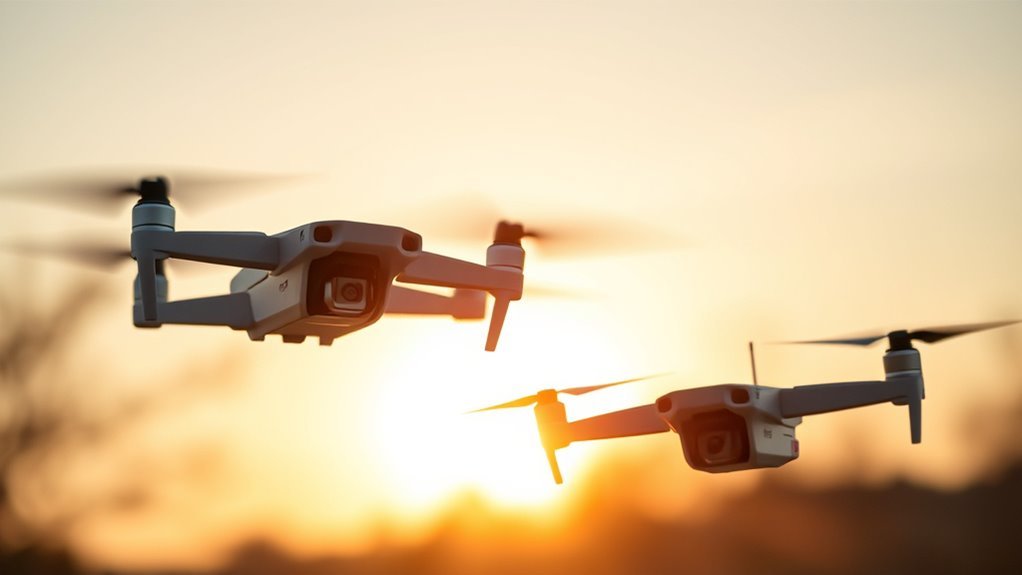When you’re choosing between the DJI Mini 3 Pro and Autel EVO Nano+ V2, you’ll find DJI’s APAS 4.0 offers advanced obstacle avoidance with intelligent tracking and real-time detection, making flights safer and more reliable. Autel’s basic system uses simple sensors for alerts but falters in cluttered or low-light scenarios, limiting its versatility. DJI edges ahead with longer flight time and better camera quality for enhanced experiences. Further insights await to guide your decision.
DJI Mini 3 Pro’s APAS 4.0 Features
The DJI Mini 3 Pro’s APAS 4.0 represents a key advancement in obstacle avoidance, integrating advanced sensors and algorithms to detect and navigate around potential hazards during flight. You’ll appreciate how intelligent tracking enhances your aerial adventures, allowing the drone to follow moving subjects with seamless precision, whether you’re capturing dynamic scenes or exploring freely. Obstacle detection works in tandem, using multiple sensors to identify and sidestep objects in real time, giving you peace of mind during flights.
Analytically, this system boosts reliability by combining intelligent tracking’s adaptive algorithms with robust obstacle detection, minimizing interruptions and enabling longer, safer sessions. As an enthusiast seeking freedom, you’ll find APAS 4.0 objectively elevates control, letting you focus on creativity rather than risks. Its efficiency guarantees that even in complex environments, your drone operates autonomously, empowering you to chase horizons without constraints. Overall, these features deliver a balanced, user-centric experience that prioritizes both safety and exploration. Additionally, the integration of GPS return-to-home ensures that you can confidently explore new areas while maintaining a safety net for unexpected situations.
Autel EVO Nano+ V2’s Basic Avoidance System
While Autel EVO Nano+ V2’s basic avoidance system relies on simple sensors, it effectively detects nearby obstacles to prevent collisions during flight. You’ll appreciate how its basic avoidance capabilities use ultrasonic and vision sensors to alert you in real-time, allowing freer exploration in open areas without constant manual oversight. This setup enhances your flying experience by prioritizing autonomy, letting you capture aerial shots with minimal interference.
Analytically, though, the system’s collision detection limitations become evident in cluttered environments. It struggles with fast-moving objects or low-light conditions, potentially requiring you to take control to avoid mishaps. Objectively, this means you’re trading advanced features for a lightweight, portable design that keeps things simple and accessible. By understanding these constraints, you can maximize your freedom in the skies, ensuring safer, more enjoyable flights tailored to your adventurous spirit. Ultimately, it’s about balancing capability with the joy of unrestricted drone use. Additionally, advanced features like obstacle avoidance systems can significantly enhance safety during complex maneuvers.
Head-to-Head Comparison and Performance Insights
As we compare the DJI Mini 3 Pro and Autel EVO Nano+ V2 head-to-head, you’ll notice their performance differences hinge on factors like flight time, camera quality, and obstacle avoidance. For flight time, the DJI Mini 3 Pro delivers up to 34 minutes, granting you extended freedom to wander open skies without frequent recharges, while the Autel EVO Nano+ V2 offers about 28 minutes, still allowing solid exploration but with quicker returns. In camera quality, DJI’s 1/1.3-inch sensor excels in low-light scenarios and 4K video stabilization, empowering you to capture vivid, professional footage effortlessly during dynamic flights. The Autel’s 1/2-inch sensor performs well in bright conditions but may lag in detail and adaptability, potentially curbing your creative liberty. Overall, these insights highlight how DJI edges ahead for seamless, worry-free adventures, whereas Autel’s simplicity appeals if you prefer a more hands-on approach to maintain control and independence in the air. Additionally, the DJI Mini 3 Pro’s advanced shake reduction techniques ensure rock-steady performance, enhancing the quality of your footage even in challenging filming scenarios.
Frequently Asked Questions
How Much Does the DJI Mini 3 Pro Cost?
You’re curious about the DJI Mini 3 Pro’s cost, which varies by retailer and bundle. Pricing options typically range from $550 to $750, depending on features like accessories or warranties. In market comparison, it’s competitively priced against rivals, offering solid value for your aerial adventures. This lets you freely choose based on budget, ensuring you’re not tied down by high costs while enjoying reliable performance.
What Is the Battery Life of Autel EVO Nano+ V2?
You’re curious about the Autel EVO Nano+ V2’s battery life, which showcases solid battery performance and flight duration. This drone offers up to 30 minutes of flight time per battery, letting you explore freely without frequent interruptions. Analytically, this duration enhances your aerial adventures, providing ample time for creative shots while maintaining efficiency. For maximum freedom, carry extra batteries to extend your sessions effortlessly.
Are Accessories Included With These Drones?
When you’re asking if accessories are included with your drones, you’ll find that accessory compatibility often varies. For many models, essentials like a remote and batteries come in the box, but items such as extra props, cases, or filters typically require additional purchases to enhance your flying freedom. This setup lets you customize based on needs, avoiding unnecessary costs while maintaining control over your aerial adventures. Always check the package details for specifics.
Do I Need a License to Fly Them Legally?
Like a bird gliding effortlessly through the open skies, you might wonder if a license is needed to fly your drone legally. Drone regulations vary by country and drone weight; in many places, like the US, drones under 250g often don’t require pilot certification for recreational use. However, for commercial flights or restricted areas, you’ll need it to stay compliant and preserve your flying freedom. Always check local rules for peace of mind.
What Is the Warranty Period for Each Drone?
When you’re exploring the warranty periods for drones, a warranty comparison reveals insights into drone reliability. For the DJI Mini 3 Pro, you’ll get a standard 1-year warranty, covering potential defects to guarantee dependable performance. The Autel EVO Nano+ V2 also offers a 1-year warranty, emphasizing reliability through manufacturer support. This setup lets you fly freely, knowing you’ve got backup for peace of mind. Weigh these options analytically to choose what’s best for your adventures.

